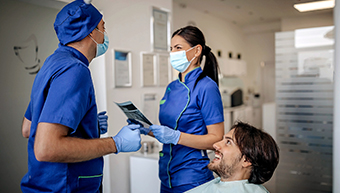 05 Oct 2021
05 Oct 2021
Good oral hygiene habits will help you avoid most dental problems, but you may still need to undergo oral surgery.
Dental surgery, also often referred to as oral surgery, encompasses any surgical procedure involving the teeth, gums, or jawbone. Many people have their first oral surgery when their wisdom teeth are removed. Some need additional procedures later in life.
Our guide will help you prepare for dental surgery so you can feel more at ease when taking this important step for your oral health.
Why Do You Need Dental Surgery?
You might need oral surgery to remove:
- Broken teeth
- Impacted teeth, including wisdom teeth
- Teeth with abnormal roots, including curved roots or abnormally long roots
- Root tips left from previous tooth extractions
- Teeth that are rooted in very dense parts of your jawbone
Other common types of dental surgery include:
- Root canals
- Bone grafting
- Gum grafting
- Implant placement
10 Things to Do Prior to Your Procedure
You will have a much more positive experience with oral surgery if you are properly prepared. These ten tips will help you get yourself set up for success.
Read Your Pre-Op Instructions
When you book an appointment for any oral surgery, you will receive a set of pre-operative instructions to guide you through the process. Read it carefully to learn what your surgeon needs you to do and what to expect when your appointment date arrives.
Get Your Medication Ready
You will likely be on medication for several days following your surgery. It is best to have this medication ready and waiting for you at home before your surgery begins to minimize your discomfort. You can ask your dentist to give you your prescription in advance so you can fill it before your appointment.
Arrange Your Ride Home
You will not be able to drive yourself home after having oral surgery, so be sure to make arrangements for this in advance. Ask your friends and family if anyone is available to help you get home.
If no one can help you with this, you will be asked to wait a while in the dentist’s office before you call a cab. This is to ensure that your medication has worn off enough for you to stay safe during your trip. It is not safe to take public transportation so soon after oral surgery.
Stock Up Your Pantry
You will not be able to eat your regular diet for a few days after your oral surgery, and you will probably not feel up to the task of going grocery shopping. Instead, visit the store before your surgery and stock up on healthy foods you don’t have to chew, such as soups, protein shakes, applesauce, and milk. You can also get yourself some ice cream or popsicles as a treat and to help reduce pain and swelling.
Fast The Day Before
If you will be under general anesthesia during your surgery, your dentist will ask that you not eat or drink anything for at least 8 hours before your procedure. This will reduce your risk of aspiration (breathing food or other substances into your lungs). If you need to drink something to take medications, limit yourself to a very small sip of water.
Do Not Smoke
Do not smoke for at least 12 hours before your oral surgery and at least 24 hours after it. This will keep your blood vessels from contracting and slowing the healing process.
Choose the Right Clothing
The night before your surgery, choose the clothes you will wear the next day. This should be comfortable clothing without long sleeves. If you are cold, choose a cardigan or zip-up sweater that can be easily removed. This will help the dental team assisting with your surgery to check your vital signs and blood pressure or deliver IV fluids as needed.
Get a Good Night’s Sleep
Good sleep is essential to good oral surgery outcomes. It might be difficult to sleep knowing what is coming the next day but do your best to relax and get some quality rest the night before your surgery.
Arrive Early
You will need about 20 minutes to fill out the required paperwork before your surgery, so be sure to arrive before your scheduled surgery time. If you have anything to discuss with your oral surgeon before your procedure begins, remember to account for that time as well.
Ask Any Unanswered Questions
Oral surgery can be a confusing and intimidating process, but your dental team is there to help you through it. If you have any questions about what your surgery will be like, whether there are any risks or side effects involved, or what your recovery will be like, ask. Your dentist will be happy to ease your fears and help you feel confident and relaxed going into the procedure.
Tips for a Smooth Recovery
 After your surgery is over, it is essential that you take some time to relax and let your body heal. Take time off work if you can, and get plenty of rest when you feel you need it. Do not do any heavy lifting until your dentist says it is okay, as the strain may affect the surgical site. Brush your teeth as usual but be extremely careful not to disturb the area.
After your surgery is over, it is essential that you take some time to relax and let your body heal. Take time off work if you can, and get plenty of rest when you feel you need it. Do not do any heavy lifting until your dentist says it is okay, as the strain may affect the surgical site. Brush your teeth as usual but be extremely careful not to disturb the area.
You should also take your time working up to eating solid foods again. Start with liquid or very soft foods for a few days, then try something a bit more substantial when you feel ready. Many people choose pasta or mashed potatoes once they move past liquids. Every patient is different, but many are not able to resume their regular diet until at least a week after their surgery.
Take your medications as directed by your dentist, and be sure to let them know if you are still experiencing significant pain despite following their directions. This may be a sign that you are developing complications that will need further attention.
Book Your Surgery at the Best Dental Clinic in Mississauga
With the proper preparation and a dental team you trust, oral surgery is nothing to be afraid of. Dr. Joshua Shieh is an excellent dentist in Mississauga who has successfully performed countless surgeries including gum grafts, wisdom tooth extractions, dental implants, root canals, and other procedures. Not only does his professional expertise consistently achieve good results, but his warm, friendly approach helps his patients feel more at ease. Call us today at 905-828-9894 to book a consultation for oral surgery or to schedule your surgery date. Together, we will get you through this stressful time and improve your oral health.
Also Read:
